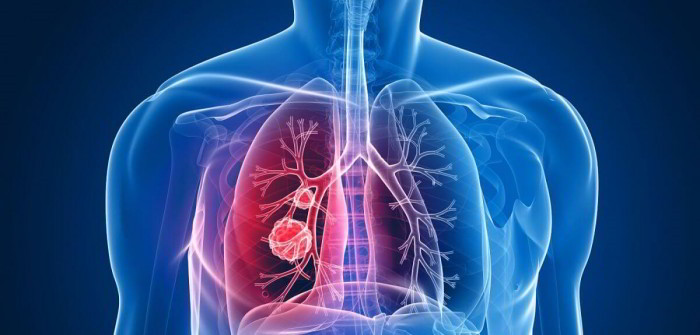A common tumour that grows within the airways of the lungs.
 Causes of Lung cancer
Causes of Lung cancer
The evidence is overwhelming that the main cause of lung cancer is cigarette smoking. Cigarette smoke contains hundreds of different components and tars, so just which component is actually to blame is unclear. None the less, reputable research has shown beyond all reasonable doubt that the more cigarettes people smoke and the longer they smoke, the higher their chances are of getting lung cancer. The chances become even higher if the individual is also exposed to other irritant atmospheres such as coal mining or to asbestos. It appears that constant exposure to these substances irritates the lining of the main breathing tubes (bronchi), eventually turning cells malignant.
About 15% of cases of lung cancer occur in non-smokers, a percentage of which can be attributed to passive exposure to cigarette smoke.
Symptoms of Lung cancer
Most cases begin in an undramatic way as a persistent cough or with dull aching over part of the chest. Other suspicious features are coughing up blood and recurrent chest infections that are slow to improve. As the disease progresses there may be other features of cancer, for example weight loss, a vague feeling of ill health or loss of appetite. Lung cancer commonly spreads elsewhere in the body and so can produce symptoms in bone (with pain), within the brain (epileptic fits, confusion) and the liver (jaundice). When faced with such symptoms in smokers doctors will think immediately of lung cancer and order a chest X-ray.
If the X-ray shows a tumour, the diagnosis has to be checked by obtaining a sample of it. This is commonly done by a technique called a bronchoscopy where a llexible fibreoptic tube is guided to the tumour so that a sample can be taken for analysis.
Treatment of Lung cancer
Unfortunately, lung cancer can rarely be cured. However, it is possible to give worthwhile relief by cutting out the affected part of the lung. Also, radiotherapy will shrink the tumour for a while, so relieving a cough or breathlessness, Radiotherapy is also used in treating the spread from the tumour, for example secondary cancer in the brain or in bone.
There have been many attempts at developing chemotherapy for lung cancer but so far without finding a cure. At present chemotherapy may halt progress of the disease by about a year at the cost of side effects such as nausea and hair loss.
Why wait to get lung cancer? Stopping smoking results in a steady reduction in risk; even two years after quitting the risks of getting lung cancer are much lower and carry on falling for many years thereafter.
Commonly Asked Questions
Why don’t all smokers get lung cancer?
Not all mountaineers Jail, but if you’re not a mountaineer you can’t fall off a mountain . . . Smokers often comfort themselves by arguing that many smokers do not get lung cancer. About 25% of all smokers will die from a disease caused by smoking, be it heart disease, chronic bronchitis or lung cancer.
Is there any way of screening for lung cancer?
Not as yet. Trials have shown that while regular X-ray screening will detect early cancers it does not improve survival. It is important to report to your doctor any of the early symptoms mentioned previously.
Are low-tar cigarettes safer?
They are. Part of the fall in the numbers of cases of lung cancer in men in recent years is thought to be due to a switch to these types of cigarettes, although there is always the danger that smokers who switch to low-tar cigarettes will compensate by inhaling more deeply. Low tar is safer, but it is not safe.
Complementary Treatment of Lung cancer
Complementary therapies cannot cure cancer, and they should be used only alongside conventional approaches; in this way they can offer much support. Chakra balancing is a deep relaxation technique, which will help with symptom control and energy balance. Hypnotherapy can help you visualize your tumour being attacked by drugs. Aromatherapy, especially combined with gentle massage, is excellent for reducing the stress and tension of coping with cancer. Reflexology can encourage a positive attitude during treatment. Other therapies to try: see Stress.
 Causes of Lung cancer
Causes of Lung cancer
 (59 votes, average: 4.76 out of 5)
(59 votes, average: 4.76 out of 5)